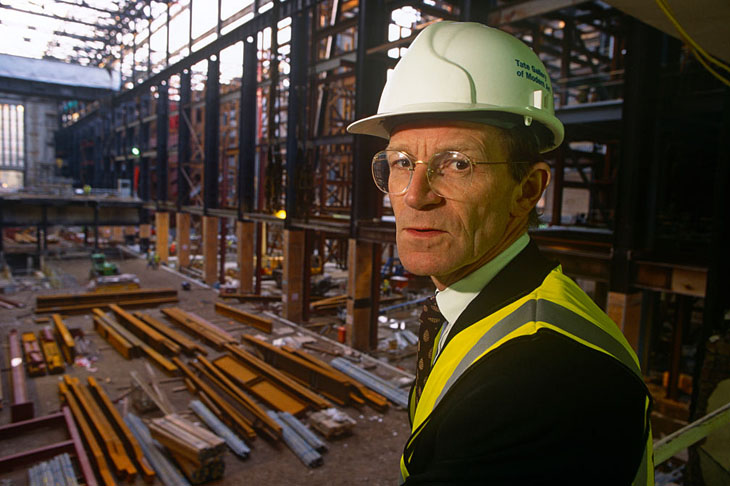Amid the general political turmoil, a flutter of hope has greeted the arrival of Sir Nicholas Serota as chairman of Arts Council England, an organisation of fading relevance. Sir Nick, grand impresario of the Tate galleries, started life as an Arts Council gofer in 1969, taught to hang pictures by the flamboyant David Sylvester, friend of Lucian Freud, Bacon and Giacometti. Sylvester was one of many outsized brains that fuelled the quango in its heyday. Think Stuart Hampshire, Alan Bullock, Marghanita Laski, Richard Hoggart. No one like that left now. Might Serota signal a revival?
The omens are not auspicious. In the past 20 years, the Arts Council has shed most of its ethos. The rot began in 1997 when the incoming Blair regime demanded social reform in exchange for state cash. Arts organisations were ordered to expand education. Subsidy was pegged to compliance. Orchestras had to demonstrate that they and their audiences matched the national demographic in gender, race and sexual orientation. Proof was demanded in triplicate. A request for state funding grew from one sheet of paper to a fat sheaf of boxes, all of which have to be ticked. Managers tell me it can now take three days to complete a repeat application for musical subsidy.
Politics polluted the process. Under Blair, dosh was pumped into Labour’s north-east heartland and drained from the south-west. Gerry Robinson, a Labour donor who had trashed ITV’s best drama department, was made ACE chairman. The Keynesian imperative of nurturing art at grass roots gave way to corporate speak. Expert panels that once doled out grants after case-by-case debate were dissolved. John Major’s Lottery bonanza, intended for arts and sports, was divvied up by Blairites to education, environment, health, heritage and charities.
Amid these Whitehall assaults, old-timers clung with brave tenacity to Maynard Keynes’s ‘arm’s-length’ principle of independence from government. In 2008, a Labour culture secretary abolished the ACE’s autonomy. With an effrontery that takes the breath away. James Purnell sent one of his own civil servants, Alan Davey, to become ACE chief executive. Davey’s partner, Paddy Feeny, remained head of communications at Purnell’s department. The distance between Whitehall and ACE was reduced to the length of a broken fingernail.
Gordon Brown, as prime minister, tightened the noose. When Downing Street’s candidate failed abjectly at audition for a top job at the ACE’s South Bank sub-quango, the board was ordered to appoint him anyway. The Tories were no improvement. Jeremy Hunt, as culture secretary, installed his crony Peter Bazalgette to chair ACE. Purnell and Davey are now heads of BBC Radio and BBC Radio 3 respectively. As if Lord Nolan never lived.
This is the ACE that Serota inherits as chairman, a half-demolished institution that lacks vision or enthusiasm, autonomy or self-belief. Serota, an empire builder of strong views and independent mind, has the advantage of proven achievement. He will not do the bidding of the latest Tory seat-warmer at the Department of Culture.
But the body he inherits is maimed. Gone are the Oxbridge dons who used to grip the boardroom with Socratic reasoning as to whether one string quartet was worthier of support than another. Gone, too, is the ACE’s role as an incubator for arts managers, a place where Serota himself learned how to manage talent. Nowadays, ACE officials are trained in nothing more useful than ensuring all boxes are ticked, all regions represented. After that everyone, good or worse, will have prizes.
Theirs is a job you might think could be done by computer — and that’s exactly what’s about to happen. Some weeks ago, the ACE issued a £2.7 million invitation to tender for ‘a monitoring system that will measure the artistic quality of the work of its National Portfolio Organisations’.
It is the ACE’s largest-ever commission and it has already consumed more than £700,000 in planning the criteria that are being fed into the computer. Some of these ‘core quality metrics’ are infantile beyond belief. They include ‘Challenge: it was thought-provoking’ and ‘Captivation: it was absorbing and held my attention’. Originality is defined as ‘it was ground-breaking’.
This, give me strength, is how decisions are made in 2017, how the arts are funded. Mortal intelligence has been rendered redundant. Computer says yes or no. The Keynesian ideals that regenerated our national creativity in 1945 have been lost in translation to a mechanised, insensate method of keeping the arts docile. This week, four national companies were subjected to an identical £2.5 million haircut instead of all the money being taken, decisively for once, from the failing, hapless South Bank. Bringing back the human factor is the main challenge facing Sir Nicholas Serota. Unless he can overturn the ACE’s anti-art evolution, there will be nothing left at the Arts Council worth chairing except, after 72 years, its memorial service.





Comments